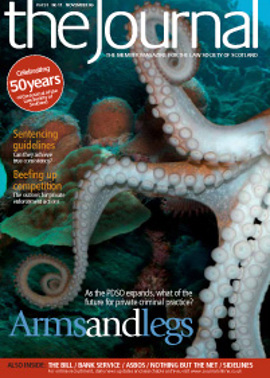Enough is enough

Change of agents
Another two cases in the “enough is enough” series. In Fernandez v Fernandez [2006] CSOH 133; 2006 GWD 28-617 decree by default was granted in a long running matrimonial dispute. Prior to an adjourned proof diet, the defender’s solicitors intimated that they were withdrawing. After intimation another firm of solicitors was instructed. This new firm enrolled a motion to discharge the adjourned proof diet due to the lateness of their being engaged.
The motion to discharge was refused. Lord Macphail considered that there were no reasons given for the lack of progress on the part of the defender, the withdrawal of instruction from his solicitors, and his failure to instruct new solicitors immediately thereafter. The action had been ongoing for over two years, there had been delays during the proceedings and the pursuer would be prejudiced by further delay. Counsel were not available again until 2007.
Thereafter on the first day of the adjourned proof, it was intimated that the new firm of solicitors had withdrawn as they could not provide proper representation. The defender was aware of the consequences of their withdrawal and his non-appearance at the proof. The pursuer moved for decree by default. Lord Macphail granted decree. The way in which the defender had conducted the litigation suggested very strongly that he had no intention of conducting it properly. In addition, to delay matters further would prejudice the pursuer.
Failure to amend
In Henderson v The Royal Bank of Scotland plc [2006] CSOH 164; 18 October 2006, again a line was drawn by Lady Smith although the consequences were not initially as severe. At the calling of a diet of debate in which the pursuers sued for damages for negligent misrepresentation, the pursuers moved to discharge the debate. Counsel accepted that the pursuers’ averments were deficient. The reason for this was that the pursuers had had difficulties obtaining a report from forensic accountants. A report produced a year before had been unsatisfactory. Attempts had been made by the pursuers to progress matters. A previous motion to discharge had been refused. A further report had been produced in draft at consultation the previous day. Whilst it was not in final form, the pursuers should be able to amend shortly but it was not possible to specify when the report, and thus an amendment, would be available. The defenders opposed the motion. There were other problems with the pursuers’ averments apart from matters to which the report was addressed. The pursuers had been aware of the criticisms of their averments for months.
The motion was refused. Lady Smith noted that no attempt had been taken by the pursuers to produce an amendment dealing with the other criticisms of their averments. She observed that a suggestion that there seemed little point in lodging a minute of amendment until all matters could be rectified was a somewhat leisurely approach to litigation. The delay which had elapsed without any remedial steps being taken towards pleadings which it was accepted were deficient (both as a result of an assessment by the pursuers’ advisers but also in light of the defenders’ note of arguments) was inexplicable. Her Ladyship could not have any confidence that an appropriate minute of amendment would appear shortly. The motion was refused and at the conclusion of the debate the action was dismissed.
A case for opposition
Lady Smith’s decision reminds me of a decision from Lord Clarke in Rodwell v City of Edinburgh Council 2001 GWD 2-82. I have to say I have always been surprised that this latter decision does not appear to be used by a party opposing a motion to amend at a diet of debate. I am further surprised that it has never been reported as far as I am aware. In Rodwell the pursuer was allowed to consider overnight what amendment was required in order that the court could be advised in detail as to the content of the amendment the next day. At the debate the defenders had sought dismissal of the action. The following day details were not forthcoming. The pursuer sought then to avoid dismissal listing a number of reasons. Lord Clarke dismissed the action. The pursuer had been aware of the arguments being made against his averments for some time as a result of the defenders’ note of arguments. There were formidable problems facing the pursuer’s pleadings which should have been apparent to anyone. It was accordingly unreasonable for the pursuer to delay matters further when he could not give details as to what the amendment would say.
Bearing in mind the tests which should be satisfied before a case is remitted to debate at an options/procedural hearing and the requirements as to the content of a rule 22 note, it seems to me that the granting of leave to amend at debate should be more difficult? It certainly should not be automatic and accordingly I am surprised that in many cases such a motion is not opposed. The motion still seems to be met by the advocacy equivalent of the shrug of the shoulders, accompanied by the comment “Well it is the first debate!” Further, if granted, could there be a justification for seeking a greater award by way of expenses?
Summary applications
In Gardner v City of Edinburgh Council 2006 GWD 33-683 the pursuer appealed against the sheriff at first instance not hearing evidence and refusing the application. A hearing on the application and answers had been assigned. At that hearing the sheriff proceeded to deal with the matter without evidence. A number of factual matters had been agreed for the purposes of the hearing. Sheriff Principal Bowen had little difficulty in rejecting this appeal. Whilst at the first calling of a summary application the sheriff should determine whether the subsequent hearing is to be a debate or proof and this should be specified in the interlocutor, the sheriff had been well able to deal with the application on the basis of the agreed facts.
Expenses
In Gerard v R W Sives Ltd 2006 GWD 32-680 Sheriff Principal Bowen dealt with an issue arising from a note of objections to an auditor’s report. This related to whether a charge for the principal agent as opposed to a local correspondent was appropriate. The view of the auditor, supported by the sheriff, was that whether the principal agent as opposed to a local correspondent was appropriate depended on a number of factors including complexity and the knowledge of the principal agent. Further, another issue was the predictability of the hearing concerned. On that basis the attendance of the principal agent at the court hearing was justified. This was not the case for the diet of taxation, particularly where the account in its original form was inaccurate.
The usual caveat applies.
In this issue
- Home and away
- The importance of kinship care
- Growing arms and legs
- Changing its spots?
- Guiding hand
- Trustbusters unite
- Closing the books
- Spam: the managed solution
- Nothing like Nothing but the Net!
- Banking on service
- You want certified?
- Enough is enough
- Provision and prejudice
- Work and families
- Cash trapped
- Man of business
- Scottish Solicitors' Discipline Tribunal
- Website reviews
- Book reviews
- Sale questionnaire to be tested
- So long, and thanks for all the fizz
- ASBO, the young misfit






